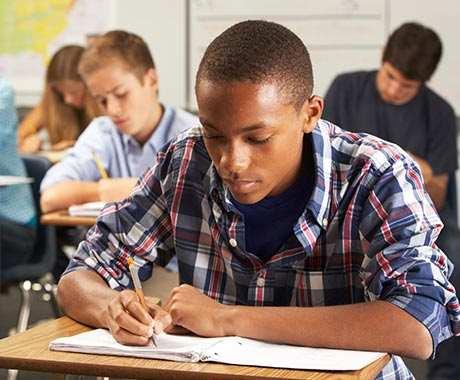Story Highlights
- 51% of U.S. adults believe college education is very important
- Women more likely than men to say college education is very important
- Younger adults, Republicans less likely to rate college as very important
About half of U.S. adults (51%) now consider a college education to be "very important," down from 70% in 2013. Over the same period, the percentages rating college as "fairly important" and "not too important" have both increased, to 36% and 13%, respectively.
| 2013 | 2019 | ||||||||||||||||||||||||||||||||||||||||||||||||||||||||||||||||||||||||||||||||||||||||||||||||||
|---|---|---|---|---|---|---|---|---|---|---|---|---|---|---|---|---|---|---|---|---|---|---|---|---|---|---|---|---|---|---|---|---|---|---|---|---|---|---|---|---|---|---|---|---|---|---|---|---|---|---|---|---|---|---|---|---|---|---|---|---|---|---|---|---|---|---|---|---|---|---|---|---|---|---|---|---|---|---|---|---|---|---|---|---|---|---|---|---|---|---|---|---|---|---|---|---|---|---|---|
| % | % | ||||||||||||||||||||||||||||||||||||||||||||||||||||||||||||||||||||||||||||||||||||||||||||||||||
| Very important | 70 | 51 | |||||||||||||||||||||||||||||||||||||||||||||||||||||||||||||||||||||||||||||||||||||||||||||||||
| Fairly important | 23 | 36 | |||||||||||||||||||||||||||||||||||||||||||||||||||||||||||||||||||||||||||||||||||||||||||||||||
| Not too important | 6 | 13 | |||||||||||||||||||||||||||||||||||||||||||||||||||||||||||||||||||||||||||||||||||||||||||||||||
| Gallup | |||||||||||||||||||||||||||||||||||||||||||||||||||||||||||||||||||||||||||||||||||||||||||||||||||
Decline in Positive Ratings of College Are Steepest Among Young Adults
Perceptions that a college education is very important have declined in the U.S. among all age groups since 2013, but the drop has been especially pronounced -- 33 percentage points -- among adults aged 18 to 29. As a result, younger adults are now less likely than middle-aged adults and seniors to consider college as very important, whereas the different age groups held similar perceptions in 2013.
Currently, slight majorities of adults aged 30 to 49 (51%), 50 to 64 (55%), and 65 and older (55%) say a college education is very important, compared with less than half of 18- to 29-year-olds (41%).
| 2013 | 2019 | ||||||||||||||||||||||||||||||||||||||||||||||||||||||||||||||||||||||||||||||||||||||||||||||||||
|---|---|---|---|---|---|---|---|---|---|---|---|---|---|---|---|---|---|---|---|---|---|---|---|---|---|---|---|---|---|---|---|---|---|---|---|---|---|---|---|---|---|---|---|---|---|---|---|---|---|---|---|---|---|---|---|---|---|---|---|---|---|---|---|---|---|---|---|---|---|---|---|---|---|---|---|---|---|---|---|---|---|---|---|---|---|---|---|---|---|---|---|---|---|---|---|---|---|---|---|
| % | % | ||||||||||||||||||||||||||||||||||||||||||||||||||||||||||||||||||||||||||||||||||||||||||||||||||
| U.S. adults | 70 | 51 | |||||||||||||||||||||||||||||||||||||||||||||||||||||||||||||||||||||||||||||||||||||||||||||||||
| 18-29 | 74 | 41 | |||||||||||||||||||||||||||||||||||||||||||||||||||||||||||||||||||||||||||||||||||||||||||||||||
| 30-49 | 70 | 51 | |||||||||||||||||||||||||||||||||||||||||||||||||||||||||||||||||||||||||||||||||||||||||||||||||
| 50-64 | 68 | 55 | |||||||||||||||||||||||||||||||||||||||||||||||||||||||||||||||||||||||||||||||||||||||||||||||||
| 65+ | 67 | 55 | |||||||||||||||||||||||||||||||||||||||||||||||||||||||||||||||||||||||||||||||||||||||||||||||||
| Gallup | |||||||||||||||||||||||||||||||||||||||||||||||||||||||||||||||||||||||||||||||||||||||||||||||||||
Women, Minorities See College Education as More Important
Consistent with what Gallup found in 2013, women today are more likely than men to report a college education is very important (57% vs. 45%, respectively), although the figures are down among both groups. In 2013, 75% of women and 65% of men said a college education was very important.
Black and Hispanic adults, two groups that are underrepresented in colleges and universities nationally, are more likely than whites to say a college education is very important. The differences in importance by race/ethnicity are generally consistent with 2013 measures, in which black and Hispanic adults were more likely than whites to view a college education as very important.
| Very important | Fairly important | Not too important | |||||||||||||||||||||||||||||||||||||||||||||||||||||||||||||||||||||||||||||||||||||||||||||||||
|---|---|---|---|---|---|---|---|---|---|---|---|---|---|---|---|---|---|---|---|---|---|---|---|---|---|---|---|---|---|---|---|---|---|---|---|---|---|---|---|---|---|---|---|---|---|---|---|---|---|---|---|---|---|---|---|---|---|---|---|---|---|---|---|---|---|---|---|---|---|---|---|---|---|---|---|---|---|---|---|---|---|---|---|---|---|---|---|---|---|---|---|---|---|---|---|---|---|---|---|
| % | % | % | |||||||||||||||||||||||||||||||||||||||||||||||||||||||||||||||||||||||||||||||||||||||||||||||||
| U.S. adults | 51 | 36 | 13 | ||||||||||||||||||||||||||||||||||||||||||||||||||||||||||||||||||||||||||||||||||||||||||||||||
| Women | 57 | 33 | 10 | ||||||||||||||||||||||||||||||||||||||||||||||||||||||||||||||||||||||||||||||||||||||||||||||||
| Men | 45 | 39 | 16 | ||||||||||||||||||||||||||||||||||||||||||||||||||||||||||||||||||||||||||||||||||||||||||||||||
| Whites | 44 | 40 | 15 | ||||||||||||||||||||||||||||||||||||||||||||||||||||||||||||||||||||||||||||||||||||||||||||||||
| Blacks | 65 | 25 | 10 | ||||||||||||||||||||||||||||||||||||||||||||||||||||||||||||||||||||||||||||||||||||||||||||||||
| Hispanics | 66 | 28 | 6 | ||||||||||||||||||||||||||||||||||||||||||||||||||||||||||||||||||||||||||||||||||||||||||||||||
| Gallup, June 3-30, 2019 | |||||||||||||||||||||||||||||||||||||||||||||||||||||||||||||||||||||||||||||||||||||||||||||||||||
Republicans Less Likely to See Higher Education as Important
Less than half of Republicans (41%) say a college education is very important -- significantly lower than the percentages of Democrats (62%) and independents (50%) saying the same.
All major party groups are less likely today to say a college education is very important than they were in 2013. At that time, 68% of Republicans, 62% of independents and 83% of Democrats indicated college was very important.
| Very important | Fairly important | Not too important | |||||||||||||||||||||||||||||||||||||||||||||||||||||||||||||||||||||||||||||||||||||||||||||||||
|---|---|---|---|---|---|---|---|---|---|---|---|---|---|---|---|---|---|---|---|---|---|---|---|---|---|---|---|---|---|---|---|---|---|---|---|---|---|---|---|---|---|---|---|---|---|---|---|---|---|---|---|---|---|---|---|---|---|---|---|---|---|---|---|---|---|---|---|---|---|---|---|---|---|---|---|---|---|---|---|---|---|---|---|---|---|---|---|---|---|---|---|---|---|---|---|---|---|---|---|
| % | % | % | |||||||||||||||||||||||||||||||||||||||||||||||||||||||||||||||||||||||||||||||||||||||||||||||||
| U.S. adults | 51 | 36 | 13 | ||||||||||||||||||||||||||||||||||||||||||||||||||||||||||||||||||||||||||||||||||||||||||||||||
| Republicans | 41 | 41 | 18 | ||||||||||||||||||||||||||||||||||||||||||||||||||||||||||||||||||||||||||||||||||||||||||||||||
| Independents | 50 | 36 | 14 | ||||||||||||||||||||||||||||||||||||||||||||||||||||||||||||||||||||||||||||||||||||||||||||||||
| Democrats | 62 | 32 | 6 | ||||||||||||||||||||||||||||||||||||||||||||||||||||||||||||||||||||||||||||||||||||||||||||||||
| Gallup | |||||||||||||||||||||||||||||||||||||||||||||||||||||||||||||||||||||||||||||||||||||||||||||||||||
Partisan differences in the perceived importance of a college education are consistent with earlier Gallup polling that showed Republicans were far less likely than Democrats to report they had "a great deal" or "quite a lot" of confidence in higher ed.
Implications
Over the past few years, the viability of higher education has been up against the twin challenges of heightened scrutiny of its return on investment and heightened political criticism from conservatives in the U.S. This year, the "Varsity Blues" scandal added new fuel to questions about the fairness of access to higher education.
Declining belief in the importance of a college education is undoubtedly due to related concerns about affordability and access and declining confidence in higher education in general, particularly among Republicans. College tuition has increased at twice the rate of inflation over the past two decades -- forcing many to wonder if that investment is worth it, and how important a formal degree is to achieving a better job and a better life. Particularly concerning is the declining percentage of younger adults who say a college education is very important. The traditional-aged college student has already been on the decline nationally. That this group is growing more skeptical about the importance of college degrees requires colleges and universities to reflect on their educational promise and approach to attracting new students.
As for politics, a 2017 Gallup study conducted amid growing debate about free speech on college campuses found many Republicans critical of higher education for what they see as pushing a liberal agenda. Those concerns are evident in the partisan gap in ratings of higher education by both Gallup and Pew Research Center. Pew documented a substantial drop in Republicans' positive ratings of higher education between 2015 and 2017, and those lower ratings persist in 2019.
Extensive research still indicates a college degree leads to a higher-paying job, increased job security and healthier behaviors. Unfortunately, if a college education continues to feel out of reach for many and its value or political neutrality/integrity is questioned, fewer may take advantage of this unique and transformative experience.
Higher education institutions need a new strategy. Gallup can help.
- Move beyond assessing the easiest education outcomes and use Gallup analytics to measure the undergraduate experience and long-term alumni outcomes.
- Focus on the relationship between faculty and staff engagement and student success.
- Prepare students for great jobs and great lives by giving them the tools to get the most out of their college experience.





